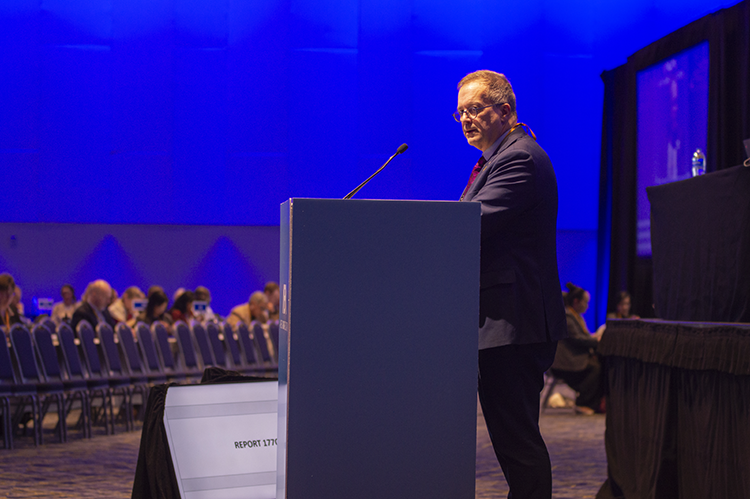New dues rates for ABA members announced

At the ABA Midyear Meeting on Monday, the House of Delegates overwhelmingly approved a new member dues structure that will go into effect on Sept. 1.
In Resolution 177C and its report, the Board of Governors recommends an increase in general member dues rates to “maintain the financial stability of the association and invest in our membership products,” such as its website and CLE platform. The Board began discussing potential changes to Fiscal Year 2025 dues rates last fall and approved the revised structure to counter significantly declining revenue over the past decade.
The House provided the final approval for new member dues rates, which include five price points for lawyers depending on their experience:
• $120: For members practicing less than five years.
• $195: For members practicing between five and nine years.
• $295: For members practicing between 10 and 14 years.
• $395: For members practicing between 15 and 19 years.
• $495: For members practicing 20 or more years.
Under the new structure, government attorneys, nonprofit and public interest attorneys, judges, solo practitioners, small firm lawyers, retirees, international lawyers and affiliated professionals will pay $195 in dues. Paralegals will pay $120. Members who qualify for multiple categories will pay the lowest amount.
“We face challenges,” said Frank “Fritz” Langrock, treasurer of the ABA, who introduced the resolution. “We also have opportunities for the ABA to advance our goals and be a better advocate for the profession. This dues increase will allow the ABA to continue to focus on advancing the member experience for current and future members.”
Follow along with the ABA Journal’s coverage of the 2024 ABA Midyear Meeting here.
First increase in a decade
 ABA Treasurer Frank “Fritz” Langrock introduced the new dues structure to the House of Delegates. (Photo by Mitch Higgins/ABA Media Relations)
ABA Treasurer Frank “Fritz” Langrock introduced the new dues structure to the House of Delegates. (Photo by Mitch Higgins/ABA Media Relations)The new dues increase will bring in about $3 million for the ABA, according to Langrock. Half of the revenues will help improve the member experience, while the other half will help the association meet its fiscal responsibilities.
The new dues rates reflect a $45 increase from those last approved by the Board and House as part of the ABA’s new membership model for fiscal year 2020. At that time, according to Resolution 177C’s report, dues were reduced by roughly 20% to address a decline in memberships and revenues. But even with the reduction, the association saw a 23% decrease in revenue and lost 0.4% of its members.
ABA leaders haven’t approved an increase in dues rates for a decade—since fiscal year 2015. Langrock contended an increase is needed now because the ABA requires more funds for membership improvements. The association adds more than 25,000 new members annually, he said, but only retains about 53% of them.
He also pointed out that “even with this proposed dues rate increase, nearly all members will still be paying significantly lower rates than they did in 2015.”
Immediate-past ABA President Deborah Enix-Ross echoed this sentiment, saying for the past 10 years, the ABA has continued to promote its value to its members and the legal profession while also dealing with significant budgetary constraints.
“And now we have heard from our finance committee and members of our Board of Governors that after careful consideration, it is time for this dues increase,” Enix-Ross said.
Former ABA President Bob Carlson also spoke in favor of Resolution 177C. He reminded members of the House that it is also their duty to continue to improve the ABA and recruit and support its members.
“All of the leaders of this association over time have said yes, as president, as chair, as treasurer, as secretary, it is our job to go out and speak on your behalf to get members,” Carlson said. “And you’ve heard me say it—and just about every other president say it—it’s everybody in this House’s job to do the same thing.”
This year’s ABA Midyear Meeting convened Jan. 31-Feb. 5 in Louisville, Kentucky.



